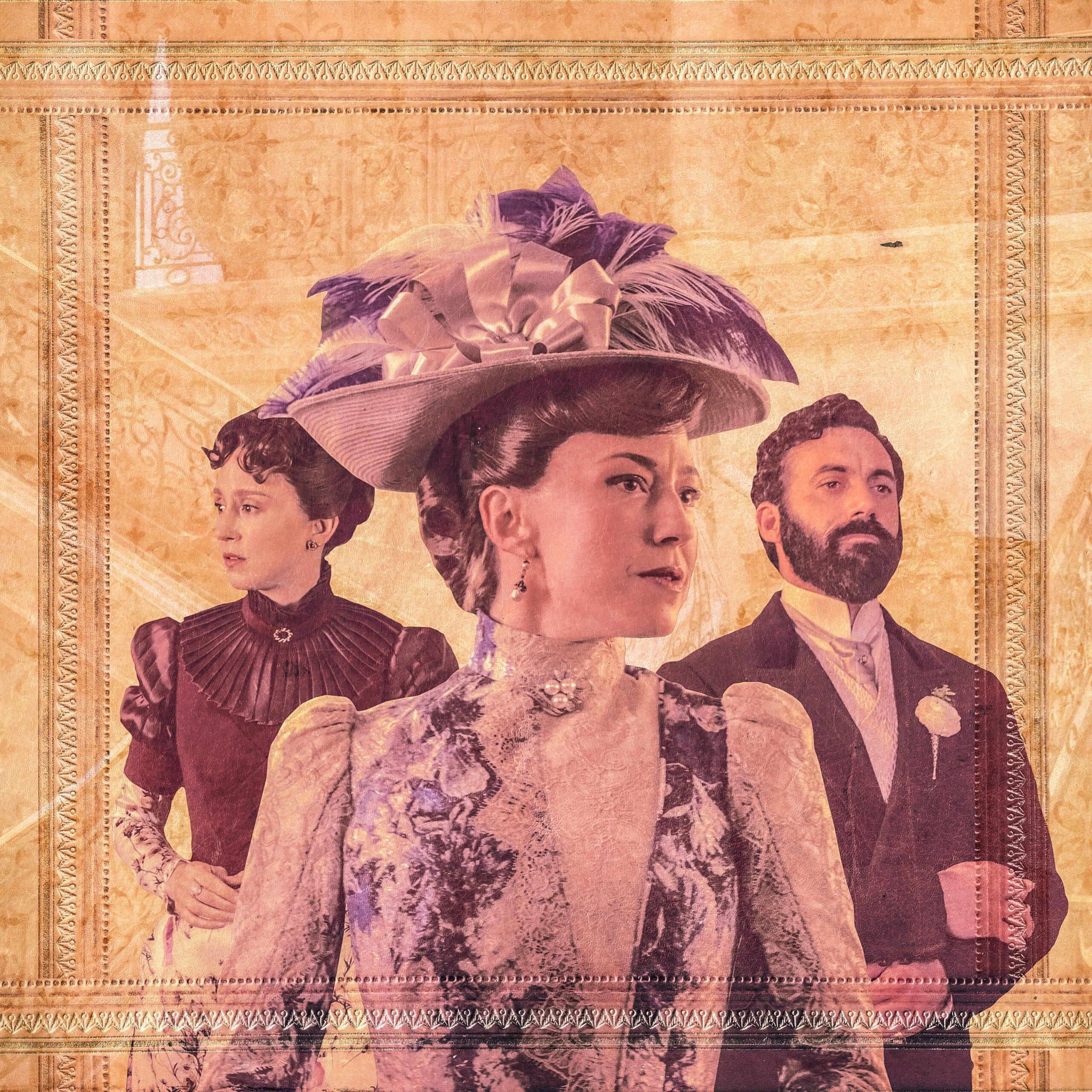
Thirteen days ago, I was an innocent. A child. I had never seen The Gilded Age. I was like a sparrow, flitting from branch to branch. Now, having seen many episodes of The Gilded Age, sometimes without even once glancing down at my phone, I am a man and dwell in wisdom. Yet I still find it valuable to look back on my earlier self in order to know fully how The Gilded Age has changed me.
In those days—those long-ago days of two weeks ago—I couldn’t help noticing that many of my close friends were Gilded Age fans. I thought they were all maniacs. I confess this to you openly. Having joined their ranks, I know how the outside world views us. I thought my friends were out of their minds, and the reason I thought so was that every conversation we had went like this:
Friend: Are you watching The Gilded Age?
Me: No, should I be?
Friend: I genuinely believe it is the worst show in the history of television.
Me: Oh, that’s too bad! I guess I’ll skip it.
Friend: It is my favorite show of the past decade.
Me: Wait, so it’s … good?
Friend: No. It is not good. I love it so much I sometimes almost start levitating.
Me: I’m confused.
Friend: It is the only thing that gives my life meaning. Some of the acting is decent.
The Gilded Age, whose third season wrapped up on Sunday, is a show about New York high society in the 1880s. It was created by the English writer Julian Fellowes, whose CV is studded with numerous classics of the “ladies in fancy hats saying indeed instead of yes” genre. Did Fellowes create Downton Abbey? Indeed. Did he write the screenplay for Gosford Park? One must frankly acknowledge that, indeed, madam, he did. The Gilded Age ostensibly explores the conflict between old money and new money, as an upstart class of millionaire industrialists attempts to break into the elite social circle dominated by long-established aristocrats with lineages stretching back to the days when New York was called New Amsterdam. Is this theme also explored by great novelists like Edith Wharton and Henry James? Indeed. Does the writing in The Gilded Age resemble their work? [Clears throat politely.]
What The Gilded Age actually explores, in any case, is twirling. More specifically, it explores how it feels to watch a camera go twirling, twirling, twirling through fantastically opulent interiors, across marble floors, over acres of Persian carpets, between stately columns, across the ornate frames of oil paintings, past silken gowns that ripple like oceans, while armies of servants remove starched cloths from grand pianos and glide past silver trays holding pyramids of champagne. Bubbles fizz in crystal flutes, cherubs gaze down from a ceiling, and through it all we twirl, dizzily waiting for our railroad shares to crash, for our inheritances to arrive, for the butler to call us to dinner.
But I’m getting ahead of myself. I knew I had to see The Gilded Age when not one but two of my friends—Leah, Jane, hello, and what is wrong with you—told me that the only way they could endure the wait between new episodes was to go back and rewatch older ones. I’m always fascinated by shows people love because of their flaws and not despite them. And so I plunged into Season 1, skipped ahead and watched part of Season 3, went back and looked at Season 2, jumped forward and watched more of Season 3, rewound the video several times to confirm that Nathan Lane is meant to be playing a sentient fried chicken drumstick …
… and eventually readied myself for the Season 3 finale, in which we learn whether the railroad magnate George Russell, played by an impressively bearded Morgan Spector, lives or dies after being shot in a dramatic plot twist at the end of the penultimate episode.
Was this out-of-order sequence the ideal way to watch The Gilded Age? Indeed. With a normal television show, we profit by proceeding in an orderly fashion. With The Gilded Age, we twirl.
As a critic, I must acknowledge that The Gilded Age has shortcomings. The premise is about as tight as anyone could wish: The new-money Russells, fresh from robber-baroning their way to untold piles of lucre, move in across the street from the old-money Mrs. van Rhijn. Mrs. Russell, played by the brilliant Carrie Coon, is determined to gate-crash the opera boxes of the elite; Mrs. van Rhijn, played by the brilliant Christine Baranski, is determined to look down her nose at anyone whose family fortune is younger than the Declaration of Independence. So far, so good, and the show has many other positive qualities, some of which are not related to set design but, honestly, most of which are. Also the costumes are great.
As for the writing … I’m afraid we’re entering more of a clearing-your-throat-politely situation. How can I put this? As a writer, Julian Fellowes sure makes shows with good set design. The dialogue veers violently between the anachronistically modern and the tinnily antique. Characters are forever saying stuff like “It’s not all about you, Cornelius!” Then three seconds later they'll be like, “Indeed, one might have rather fancied that such cogitations would have troubled your spirit before.” I do not hang out in online Gilded Age fan spaces—not yet, anyway—but my friends tell me there's a theory that you can tell how many takes it took the actors to get the scene right by how contemporary the language gets. In the earlier takes, they stick closer to the scripts, which are full of rathers and heretofores; over time, the actors start taking more liberties, and you wind up with an 83-year-old dowager heiress telling her butler to “be real for one second, jfc.”
The plotting, too, is—well, let’s be gentlemanly and call it haphazard. Season 3 is a big improvement in this regard. It moves briskly. When it introduces a subplot—say, whether the Russells’ daughter, Gladys, will be allowed to marry for love or forced to marry an English duke to satisfy her mother's ambition—it mostly seems to have a plan to bring that subplot to some sort of fruition. It’s soapy, sure; you don’t build your season finale around a rich-guy-shot cliff-hanger without meaning to be soapy. But it’s soapy on purpose, and it works.
That finale, for instance—430 things happened, which is about 428 more than what happened in all of Season 2. But the episode was crowded because it was determined to bring each of Season 3’s narrative arcs to some kind of conclusion. There was a dramatic recovery (Mr. Russell, from his gunshot wound). There was a dramatic proposal of marriage (on a dance floor, after an honest-to-God “may I cut in” moment). A pregnancy was announced. Themes were articulated. Villains were chastised. A new cliff-hanger was shoehorned into the last two minutes. Multiple lavish balls were staged simultaneously, with the requisite quantities of twirling.
Watching at home, I kept thinking about something G.K. Chesterton once said about Charles Dickens: “Dickens did not write what the people wanted. Dickens wanted what the people wanted.” I don’t know whether the people really want what the creators of The Gilded Age want, but I have no doubt at all that the creators really want it. The show possesses a sincerity that’s startling in a TV landscape that feels more cynical every year. The Gilded Age is somehow one of the goofiest shows on TV and one of the shows with the least contempt for its audience.
The earlier seasons are less soapy but also (much) less polished. I have spoken to people who were actually worried about the direction of Season 3, because they think the show might be getting too good. What if it loses the weird charm that made them fall in love with it? “Season 2,” they’ll say nostalgically, “now that’s what it’s all about.” Much of Season 2 is devoted to a glacially slow plot about rival opera houses struggling for supremacy. This plot offers no suspense whatsoever, because you’ve heard of the Metropolitan Opera and not the other one; you don’t even have to look on Wikipedia to see who wins. It’s like, “Which boxer will rise to greatness, Muhammad Ali or his cutthroat rival, Keith Chesterton?” Subplots float into view, go nowhere, and then float away forever. Stories end in the middle, having forgotten to begin. Nathan Lane says, “Mah flavah, suh, demands ranch dippin’ sauce,” not literally but in spirit. Very little happens; what does happen doesn’t always make sense.
And yet The Gilded Age is so delightful to watch. Almost everyone involved is so talented, and the material they’re working to elevate is so frequently subpar. It’s as if your local community theater director were given a billion dollars to produce the plays of his dreams, then decided to write them himself, then hired the finest cast and crew in the world and convinced them to embrace his vision. There’s a deeply earnest, warm, old-fashioned goofiness to the whole production that feels, in an era of banally competent streaming product and repellent AI gloss, like a form of generosity. At a moment when the goal of every undersaturated Prime Video original seems to be to come in under budget and get everyone home by 6, The Gilded Age wants to give you more than it has to give. It wants to lavish itself upon you. These servants are your servants, these sweeping staircases are your sweeping staircases. All this twirling is for you! If it occasionally overextends itself in its enthusiasm, well, so what? It isn’t called The Age of Cowardly Minimalism, after all.
“It’s like the TV show version of having a pet,” I told my friends after I started watching. “It has a short memory. It’s incredibly messy. Its object permanence is shaky. It constantly makes you want to say, ‘Aw, buddy, let’s get you cleaned up.’ Yet it's just a beam of pure goodness that you can't even really explain.”
It’s not just an escapist fantasy, either. I mean, it is, in that it frequently seems to be going out of its way to avoid drawing any parallels between the oligarchic culture it depicts and the oligarchic culture that’s increasingly taking over America today. It’s not really interested in the other side of wealth inequality—in poverty, in the enormous human misery its protagonists’ lifestyles inflict on the lower classes. But because of the show’s sheer narrative gawkiness, it becomes a sort of off-kilter critique of the 1 percent. As much as Fellowes would love to blur the connection, his characters have at least one thing in common with our current elites, who also spend a lot of time delivering bad dialogue on television. These people can’t even run their own TV show; how can we trust them to run the world?



